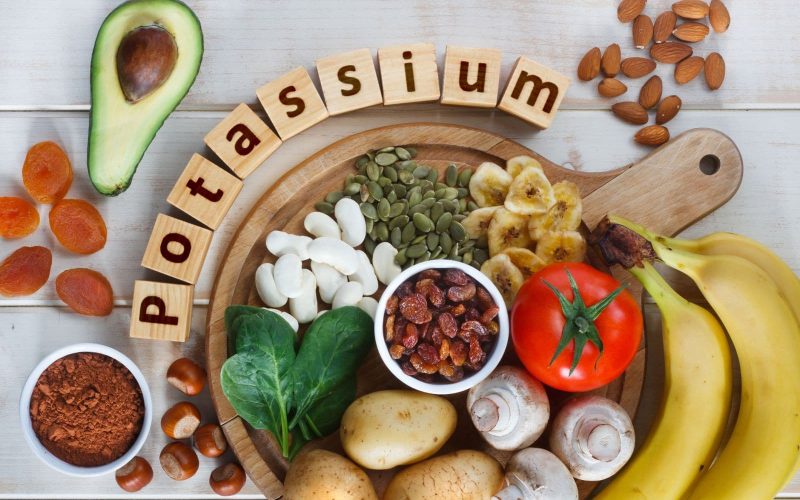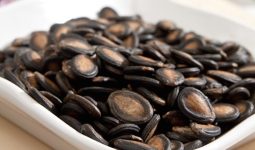Potassium is one of the seven essential macrominerals needed by the body and it is also the third most abundant mineral found in the body. Your body needs at least 100 mg of potassium on a daily basis to function optimally.
98% of the potassium in your body is located in your cells where it gets involved with many biochemical processes in your body. 80% of this is found in your muscle cells and the other 20% is found in the red blood cells, liver, and bones.
When potassium gets into your body, it functions as an electrolyte, meaning, it dissolves in water and forms positive ions which conduct electricity and helps in many electrical processes in your body.
Your body makes use of this electricity for a lot of processes like muscle contraction, nerve signals, and fluid balance.
Regular intake of potassium-rich foods has a lot of benefits on the body, it lowers the rate of mortality by 20% and it also reduces the risks of high blood pressure, stroke, loss of muscle mass, low bone density, and the formation of kidney stones.
The main function of potassium in the body is to control the electrical activity of your heart and muscles and to also control the balance of fluid in the body.
Recommended Intake of Potassium
The World Health Organization announced that most people are not meeting up to the recommended intake of 3,510 mg of potassium per day.
Also, the National Health and Nutrition Examination Survey (NHANES) reported that less than 2% of the US population meets the daily requirement of potassium and women consume less potassium than men.
The NHANES recommends a daily intake of 4,700 mg of potassium for adults and most adults do not meet this requirement. Potassium is available in the form of supplements but this increases the risk of toxicity, so the best way to get your potassium is through fresh foods, fruits, and vegetables.
This post covers all you have to know about potassium, the benefits, sources, risks, and possible side effects of potassium supplements.
Health Benefits of Potassium
1. It Regulates the Amount of Fluid in the Body
The human body is made up of approximately 70% water, 40% of this water is found in your cells in the form of intracellular fluid. The remaining is found in outside your cells in areas such as your blood, between the cells, and in the spinal fluid.
The concentration of electrolytes, especially sodium and potassium affects the amount of water in and outside your cells. The main electrolyte in the intracellular fluid is potassium and it controls and determines the amount of water inside your cells while sodium determines the amount of water outside your cells.
There is equality in the number of electrolytes in and outside the cells when this balance is affected, water will move from the side with fewer electrolytes to the side with more electrolytes just to equalize the concentrations of electrolytes.
When this happens, the cells can shrink as the water goes out of them or swell up and burst when water goes into them. This can trigger a lot of problems in this body and this is why we have to increase our consumption of electrolytes through foods.
This will help you maintain a good fluid balance which is needed for optimal health, poor fluid balance can lead to health problems like dehydration which can adversely affect your heart and kidneys.
Increase your intake of potassium-rich foods and also your intake of water, this will help you maintain a good fluid balance.
2. Improves Blood Pressure and Cardiovascular Health
Studies have linked low levels of potassium to cardiovascular disease and high blood pressure. Potassium helps you maintain a low level of sodium in the body and this is essential for maintaining healthy blood pressure.
An increase in the intake of potassium will decrease high levels of sodium in the body and this, in turn, will reduce your risks of high blood pressure and cardiovascular disease.
High blood pressure is one of the risk factors of heart disease which is the leading cause of deaths worldwide. Potassium also protects you against stroke, a disease caused by the obstruction of blood to the brain. You can prevent this log-term disease by eating potassium-rich foods.
Studies have shown that people who eat potassium-rich foods regularly have reduced risks of strokes by 24% than people who eat less. It also reduces the risks of heart disease.
In a study, it was noticed that individuals who consumed up to 4,069 mg of potassium daily had a 49% reduction in the risk of death from Ischemic heart disease when compared to people who took a thousand milligram of potassium daily.
3. It Prevents Osteoporosis
This condition is characterized by weak, porous, and hollow bones and it is linked to low consumption of calcium but interestingly, recent studies have shown that diets rich in potassium can also prevent osteoporosis by reducing the amount of calcium the body loses through urine.
In one study, 62 healthy women aged between 45 to 55 years old and they were given potassium-rich foods and it was noticed that women who ate the most of these foods had the greatest total bone mass.
Another study conducted with 994 healthy pre-menopausal women revealed that those who ate the most of potassium-rich foods had more bone mass in their hip bones and lower back.
4. It Protects the Nervous System
The nervous system passes messages between your brain and body and these messages help in regulating your heartbeat, muscle contractions, reflexes and many other functions of the body and they are delivered in the form of nerve impulses.
Potassium is important for the nervous system because it aids the movement of ions out of the cells. Nerve impulses are created when potassium ions move out of the cells and sodium ions move into the cells.
The voltage of your cells change with the movement of ions and this activates a nerve impulse. A little reduction in the levels of potassium in your body can affect the ability of your body to generate a nerve impulse.
Get enough potassium from natural foods so that your body can maintain healthy nerve functions.
5. It Prevents Kidney Stones
Clumps of materials that form in concentrated urine are called kidney stones. Calcium is the most common mineral found in kidney stones and a lot of studies have shown that potassium citrate lowers the levels of calcium in the urine.
Potassium helps fight kidney stones in this way. A lot of fruits and vegetables contain potassium citrate, including these in your diets regularly will help you reduce your risk of kidney stones.
In a study, 45,619 men were studied for 4 years and it was found that those who ate most potassium-rich foods daily had a reduced risk of kidney stones by 51%.
Also, in a similar study, 91,731 women were studied for 12 years and scientists discovered that the women who consumed most potassium daily had a 35% lower risk of kidney stones.
6. Maintains Bones and Muscles
Potassium-rich foods fight acidosis and maintain an alkaline environment in the body. Metabolic acidosis leads to a lot of health problems, it triggers the excretion of nitrogen, muscle wasting, and reduction in the mineral density of the bone.
This acidosis is caused by eating acidic foods like dairy products, meat, processed foods like cereal grains. In fact, the western diet triggers acidosis.
A sufficient amount of potassium is needed to counteract the effects of acidosis on the body, it prevents diabetic ketosis which leads to muscle wasting, thereby preserving muscle mass, especially in older people.
Some studies have also shown that a high intake of potassium-rich foods increases bone density.
7. It Reduces Water Retention
Excess buildup of fluid inside the body leads to water retention, and potassium has been used to treat this condition for years.
A high intake of potassium-rich foods can increase the production of urine and reduce the levels of sodium in the body thus fighting water retention.
8. It Regulates Heart Contractions and Muscles
The nervous system help regulates the contractions of your muscles but this can be affected by low levels of potassium thereby leading to weak muscle contractions.
Both high and low levels of potassium in the body can affect nerve signals and nerve impulse by changing the nerve cells’ voltage. Potassium is needed by the body to maintain a healthy heart, the movement of potassium in and out of the cells helps to maintain a regular and healthy heartbeat.
When you have high levels of potassium in your blood, it can affect your heart and make it flaccid and dilated. This will weaken the contractions of your heart and lead to an abnormal heartbeat.
Low levels of potassium in the blood also alter the heartbeat. The heart cannot effectively pump blood to vital organs of the body like the brain, organs, and muscles when it is not beating correctly.
In some cases, irregular heartbeat also known as Arrhythmia can be life-threatening and even lead to sudden death.
Rich Natural Sources of Potassium
Potassium is found abundantly in whole and unprocessed foods. Some of the best sources of potassium in nature are fresh green leafy vegetables, beans, potatoes, tomatoes, and avocados.
Processed foods have very low or no amount of potassium in them and they also have a high level of sodium which is unhealthy. Below are some of the amounts of potassium present in natural foods.
- A cup of cooked, drained, or boiled beet greens without salt contains 1,309 mg of potassium.
- A cup of white beans contains 1,189 mg of potassium
- A cup of drained, boiled or cooked soybeans without salt contains 970 mg of potassium
- A cup of drained, boiled, or cooked lima beans without salt contain 969 mg of potassium
- A cup of baked sweet potatoes contain 950 mg of potassium
- A cup of sliced avocado contains 708 mg of potassium
- A cup of drained, cooked, or boiled mushrooms without salt contains 555 mg of potassium
- A cup of sliced banana contains 537 mg of potassium
- A cup of red, raw, and ripe tomatoes contains 427 mg of potassium
- A cup of raw cantaloupe melon contains 417 mg of potassium
Other sources of potassium are yams, pinto beans, white potatoes, cooked spinach, peas, cooked salmon, kale, etc. fruits such as pineapples, oranges, kiwis, and apricots are rich in potassium. Whole grains, lean meats, and carrots are also rich sources of potassium.
Avoid potassium supplements, they are not the best way to get this mineral because they increase your risks of toxicity.
You should only take potassium supplements when it is prescribed by a doctor (and this occurs in cases of potassium deficiency) and it should be taken for a short while. High doses from potassium supplements can damage your gut and even cause death by an irregular heartbeat.
Regular intake of high-potassium fruits and vegetables along with your meals will help you counteract the harmful effects of the high-sodium meals you eat and reduce the risks of diseases caused by high levels of sodium.
Symptoms of Potassium Deficiency
A deficiency in this vital nutrient can cause a lot of health problems and uncomfortable signs and symptoms, medically, deficiency in potassium is called hypokalemia and it is diagnosed when the levels of potassium in the body are below 3.5 mmol/L.
Mild deficiency in potassium might not show any symptoms while an extreme deficiency in which the amount of potassium in the body is less than 2.5 mmol/L will lead to signs and symptoms like:
- Fatigue
- Malaise
- Muscle pains
- Pains all over the body
- Constipation
In extreme cases where the level falls below 2.0 mmol/L, the signs and symptoms are:
- Severe muscle pains and weaknesses
- Paralysis
- Painful obstruction in the gut
- Respiratory failure
- Intermittent muscle spasms
- Itching sensations in the hands, feet, and legs
- Tingling, numb, or crawling sensations in the hands, arms, feet, or leg
Blood tests are carried out to diagnose low levels of potassium in the body, hypokalemia is treated with the right diet and supplements. Regular blood tests will help you know the levels of potassium in your body and prevent hypokalemia and the risks it poses on the body.
Hyperkalemia
Hyperkalemia occurs when there is an excess of potassium in the body, this is caused by an excessive intake of potassium supplements, this is most especially harmful to people with kidney problems.
In this condition, the kidneys cannot remove excess potassium from the body. This can be dangerous and life-threatening if it escalates quickly. Hyperkalemia is diagnosed when the levels of potassium in the body are between 5.1 and 6.0 mmol/L. these levels are considered dangerous and they need monitoring and management.
These can cause health problems especially if the kidneys are not able to excrete the excess amount of potassium in the body. Hyperkalemia can be without symptoms and it can also show a few symptoms that are similar to those of hypokalemia.
In severe cases of hyperkalemia, one can see symptoms like shortness of breath, chest pains, and heart palpitations. It becomes life-threatening at this stage and requires immediate medical care.
Hyperkalemia is treated by stopping the intake of potassium supplements, the major cause of this toxicity and in some cases, high-potassium foods are also avoided.
High levels of potassium have been linked to cardiac arrest, and if the kidneys can’t expel this mineral from the blood, it could have a fatal effect on the heart.
Sources;
- National Nutrient Database USDA
- Dietary influences on bone mass and bone metabolism: further evidence of a positive link between fruit and vegetable consumption and bone health? NCBI
- Hypokalemia and arrhythmias ScienceDirect
- High potassium intake blunts the effect of elevated sodium intake on blood pressure levels NCBI
- Potassium intake, stroke, and cardiovascular disease a meta-analysis of prospective studies. NCBI
- Nutritional influences on bone mineral density: a cross-sectional study in premenopausal women NCBI
- Comparison of dietary calcium with supplemental calcium and other nutrients as factors affecting the risk for kidney stones in women. NCBI
- Role of dietary potassium in the treatment of hypertension NCBI







